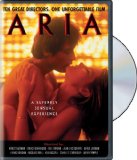| Reviews & Columns |
|
Reviews DVD TV on DVD Blu-ray 4K UHD International DVDs In Theaters Reviews by Studio Video Games Features Collector Series DVDs Easter Egg Database Interviews DVD Talk Radio Feature Articles Columns Anime Talk DVD Savant Horror DVDs The M.O.D. Squad Art House HD Talk Silent DVD
|
DVD Talk Forum |
|
|
| Resources |
|
DVD Price Search Customer Service #'s RCE Info Links |
|
Columns
|
|
|
Aria
THE MOVIE:
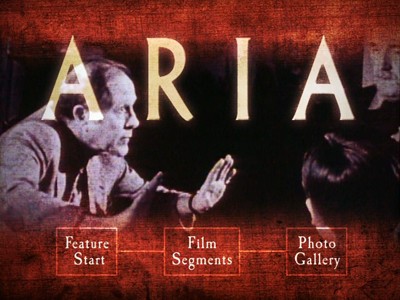
The anthology film is a difficult genre, both to make and to sell. Even when the short films being collected run along a common theme the way the 1987 film Aria does, the results are going to be a pot luck dinner where some dishes delight and some fizzle. In the case of Aria, almost all of them are at least visually interesting, but most of the pieces are merely that. Good music, interesting ideas, and some pretty pictures.
The idea behind Aria is that ten directors from around the world would choose an individual aria and make a film inspired by it. In opera terms, an aria is a piece of music originally performed solo, one voice backed by the orchestra, with a defining melody that produces an intended emotional effect. In its way, each filmmaker's performance here is the cinematic equivalent: a single writer/director riffing on a visual melody. Most of the movies are essentially silent films, with only two--Jean-Luc Godard's take on Lully's Armide and Julien Temple's amusing play on Verdi's Rigoletto--having spoken dialogue beyond the musical performance.
In addition to Temple and Godard, the other directors are Nicolas Roeg, Charles Sturridge, Bruce Beresford, Robert Altman, Franc Roddam, Ken Russell, Derek Jarman, and Bill Bryden. (Federico Fellini was also slated to participate but had to drop out--though not before the movie producer played by Buck Henry in the Temple segment could make an inside joke about the movie and Fellini's participation in it.) The directors play fast and loose with the stories, some sticking close to the source narrative (Roddam's sex and death tale for Wagner's Tristan und Isolde "Liebestod" aria; Roeg updates Verdi's Un Ballo in Maschera to be about Albania's King Zog in the early 20th century rather than the Swedish monarch the composer wrote originally about) and others go way off on their own tangents (Ken Russell's use of "Nessun dorma" from Puccini's Turandot takes some inspiration from the imagery in the lyrics but little else; Altman's take on Rameau recreates the audience that might have watched the piece being performed rather than a strict narrative from the music itself). All that really links any of the pieces beyond the concept are a series of interstitials that feature John Hurt on the way to his performance as the clown in Bill Bryden's film for I Paliacci, which closes the picture.
I Paliacci is also one of only two pieces that features actors lip-syncing to the music, and of those two, Bryden's is the only one that really works, as he mixes the audio to sound distant, as if Hurt, on stage as a singer, is actually performing to prerecorded music. There is no pretense that it is him. On the other side, Bruce Beresford's adaptation of Korngold would have us believe that a very young Elizabeth Hurley is the source of the powerful voice we are hearing, a folly if ever there was one. Beresford's may be the weakest piece overall, little more than an R-rated music video.
As a package, you will probably mostly like the chapters that represent the directors whom you are already predisposed to have some affection for. For the most part, their individual styles emerge, meaning Altman is bawdy while Russell is gaudy, Jarman is obtuse while Roeg distorts reality. For my money, I preferred Godard's arty transposing of Christian warriors for French bodybuilders and enchanted maidens for muscle groupies. Best of all, though, is music video veteran Julien Temple's comedic Verdi short. Composed of impressive tracking shots that just keep going and going, Temple sets his story in a seedy couples motel in California, where a movie producer (Henry) and his wife (Anita Morris) try to cheat on each other, not knowing their spouse is next door the entire time, and ultimately both having their new lovers (Gary Kasper and Beverly D'angelo) run off together. Of all the segments, Temple's is the one that manages to create an entire story and would actually be able to stand on its own were it separated from the whole.
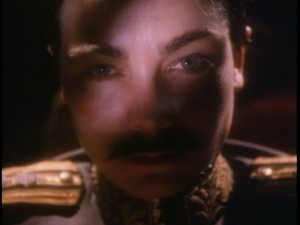
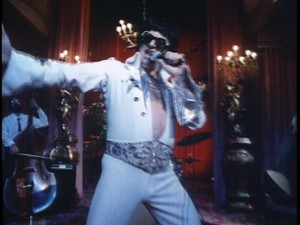
Nicolas Roeg and Julien Temple both do Verdi.
THE DVD
Video:
The transfer for Aria is quite far below acceptable standards. Though listed as a widescreen image on the package, which would keep with its original aspect ratio of 1.85:1 (or even get us close to the 1.78:1 transfer the 2002 DVD edition is alleged to have), the actual disc has the movie in full screen only. It's also a faded print with some surface scratching in a few spots, most obviously during the opening credits, and regular instances of soft resolution.
I don't have the older edition (or even its 1999 precursor) to compare this new disc to, but I would suggest holding on to that out-of-print version rather than trade it in for this one.
Sound: Despite being a subpar DVD, the package design of Aria is quite good. The cover is double-sided and housed in a clear-plastic case, so that when you open it up, you can see the handy guide to each film that is printed on the inside cover. FINAL THOUGHTS:
Jamie S. Rich is a novelist and comic book writer. He is best known for his collaborations with Joelle Jones, including the hardboiled crime comic book You Have Killed Me, the challenging romance 12 Reasons Why I Love Her, and the 2007 prose novel Have You Seen the Horizon Lately?, for which Jones did the cover. All three were published by Oni Press. His most recent projects include the futuristic romance A Boy and a Girl with Natalie Nourigat; Archer Coe and the Thousand Natural Shocks, a loopy crime tale drawn by Dan Christensen; and the horror miniseries Madame Frankenstein, a collaboration with Megan Levens. Follow Rich's blog at Confessions123.com.
The only extra here is ten galleries of still photographs taken for the production, broken down by each film, and featuring some creative twists on the usual promo still.
Skip It. A poor DVD package of an already somewhat unsatisfying film is not one that any reviewer can recommend in good conscience, particularly as there has been a better version on the market already. This kind of lazy, cursory release was barely acceptable when DVD technology was new, but to release an inferior full-frame transfer of a widescreen film that is promoted as being "a superbly sensual experience" and touts the fact that it was made by "ten great directors" is unforgivable in 2008. As a film, Aria is an interesting experiment with some successful results, but as a DVD, this edition of Aria is a complete failure. 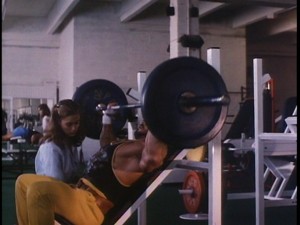
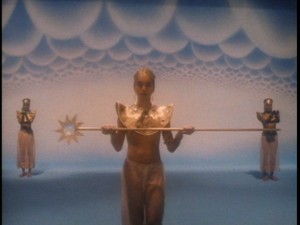
Godard tackled Lully, while Ken Russell obliterates Puccini.
|
| Popular Reviews |
| Sponsored Links |
|
|
| Sponsored Links |
|
|
| Release List | Reviews | Shop | Newsletter | Forum | DVD Giveaways | Blu-Ray | Advertise |
|
Copyright 2024 DVDTalk.com All Rights Reserved. Legal Info, Privacy Policy, Terms of Use,
Manage Preferences,
Your Privacy Choices | |||||||









